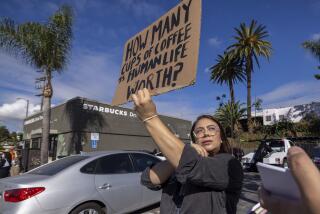Security Pacific Criticized for Opening on King Holiday
- Share via
Martin Luther King Jr. Day was a public relations fiasco for Security Pacific National Bank.
Angry civil rights leaders protested the Los Angeles bank’s decision to keep branches open on the day honoring the slain civil rights leader and vowed to take further action. They credited their protests, which included early morning picketing outside of the bank’s Los Angeles headquarters, with forcing the bank to close some branches early in minority communities such as South-Central Los Angeles.
Security Pacific was the only major bank in California to open its branches Monday. But some 20 of the bank’s 557 branches statewide either did not open or closed early in areas where, as a Security Pacific spokeswoman said, “it became obvious that those communities would not support our decision to stay open.” She did not identify the location of the branches, but did say two were on the route of a parade honoring King and would have been impractical to open anyway.
The decision to stay open on the King holiday stems from the larger retail war among California banks that escalated last year. Banks, feeling pressure to differentiate their service from the competition, are opening branches on Saturdays, Sundays, at night and on traditional bank holidays such as Columbus Day, Veterans Day and Presidents Day.
This time it backfired. In addition to Security Pacific’s troubles, an embarrassed Wells Fargo Bank last Friday decided to close its branches on Monday under pressure after declaring earlier in the week that they would be open. A bank spokeswoman said the decision came after the bank received hundreds of telephone calls at its headquarters and branches.
The third Monday in January has been a national holiday honoring King since 1986, even though surveys have shown that fewer than one in five employers nationwide give workers the day off.
Security Pacific defended its action to open branches, adding that 90% of its employees observed the holiday by taking the day off and that the bank’s parent, Security Pacific Corp., was closed. The bank added that it opened branches only as a convenience to customers and that other retail businesses, such as departments stores, were opened as well.
The dispute over the holiday with Wells Fargo and Security Pacific shows how sensitive banks are when it comes to their image with minorities.
Part of the reason stems from an increasing number of challenges to bank mergers made by civil rights groups alleging that banks do not make enough loans or extend adequate credit in low-income areas. Those groups have been using the 1977 Community Reinvestment Act, which allows regulators to look at such policies when reviewing merger plans, to pressure banks into doing more.
Last November, a group of civil rights leaders accused Wells Fargo of failing to follow equal opportunity employment and lending practices, asking regulators to block the San Francisco bank’s proposed acquisition of American National Bank. Wells Fargo denies the coalition’s allegations.
To help fight that image, large California banks such as Security Pacific recently formed a coalition to provide $100 million in loans to developers who build affordable housing.
But what clearly irked civil rights leaders is that Security Pacific has previously closed for the holiday. Mark Ridley-Thomas, executive director of the Los Angeles branch of the Southern Christian Leadership Conference, which King founded, notes that Security Pacific even specifies on the 1990 calendars it gives to customers that banks are closed in honor of the holiday.
He said civil rights groups plan to seek a commitment from Security Pacific to close in honor of the holiday in the future. He added that the dispute over the holiday will trigger a probe by the groups into the bank’s equal opportunity policies toward lending and hiring.
Security Pacific’s spokeswoman Deborah Lewis said the bank’s plans will be determined by what it believes will provide the best service for its customers.
RELATED STORY: B1
More to Read
Inside the business of entertainment
The Wide Shot brings you news, analysis and insights on everything from streaming wars to production — and what it all means for the future.
You may occasionally receive promotional content from the Los Angeles Times.










